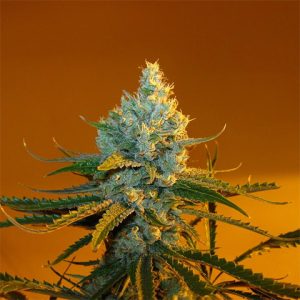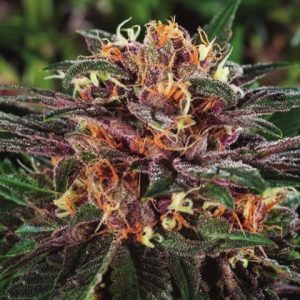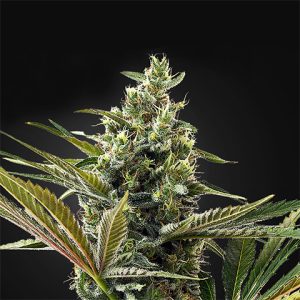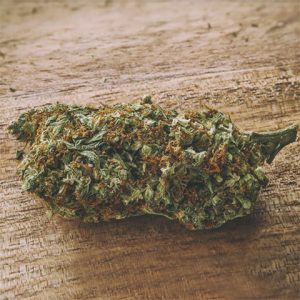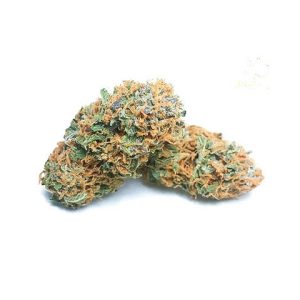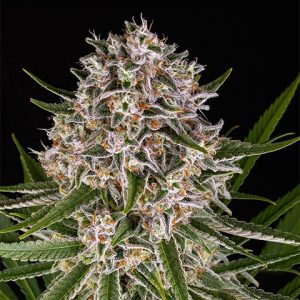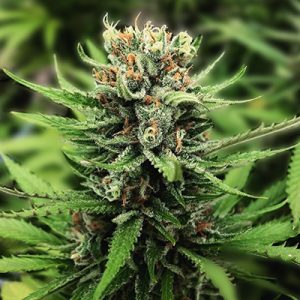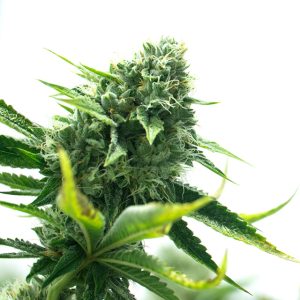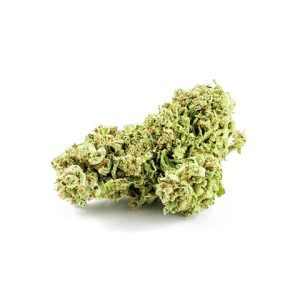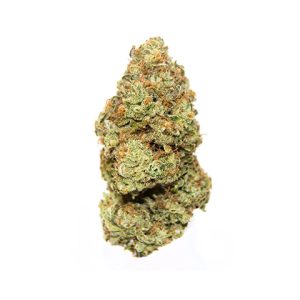Lemon Strains: Cannabis with Lemon Lineage
What Are Lemon Seeds?
Weed Seeds carries more than two dozen varieties of Lemon genetics to help you get what you’re after. Lemon family strains are a bliss-filled and powerful collection of genes with a massive range of effects from sleepy to energized depending on the cross. This marijuana has a THC content ranging from fifteen to twenty-four percent and, unless you’re looking for a CBD-heavy variety, tend to have less than one percent CBD. Most of these strains have a strong citrus flavor, some of them tasting like the juice and rind of an orange, while others are more like lemon candy. Yet others taste like the flowers and bark of a citrus tree. They’re frequently used by people with depression, stress, PTSD, and low moods. Others use the more indica side of the family to fight chronic pain and insomnia. Both sides have a tendency to promote hunger and munchies, which is a great boon for people who suffer from nausea due to medication or a loss of appetite due to disordered eating. WS carries autoflowering Lemon genes in Lemon Haze, Super Lemon Haze, Blue Lemon Haze, Lemon Skunk, Lemon Kush, and plain classic Lemon. We also have photoperiod seeds in Lemon Tree, Gorilla Glue Lemon, Lemon Haze Diesel, Lemon Garlic, Super Lemon Haze, Gorilla Lemon Fire, Lemon OG Fast, Amnesia Lemon, Original Lemon Pie, Lemon Kush, Lemon Diesel, and Sour Lemon. We carry unsexed regular seeds in Gorilla Lemon Fire, Lemon Pie, and Amnesia Lemon varieties. We also have high CBD Sour Lemon, CBD Super Lemon Haze, and CBD Lemon Skunk. Try them all!
Where Do Lemon Cannabis Seeds Come From?
Lemon is a strong branch of the Skunk family, which was the result of a group of international growers meeting up in Amsterdam and starting a house of hybrids. Popular breeding members of this family include Lemon OG Kush, Super Lemon Haze, and Lemon Pie. Lemon Pie is a more recent hybrid made by Snoop Dogg’s Leaf’s seed house. The other two are actually crosses of Lemon Skunk. Lemon Skunk is one of the major roots of this family tree. With parents from Las Vegas and Holland, this sixty percent sativa with famous parents made a big splash in weed genetics. Lemon Skunk comes from Las Vegas Lemon Skunk, a mix of Las Vegas and Amsterdam Skunk 1 genes proliferated by Sam the Skunkman and Nevillle Schoenmakers respectively. Skunk 1 is a mix of Mexican and Columbian Gold mixed with Afghani. Las Vegas Super Skunk comes from a mix of Skunk 1 and a breed called Dutch Citron Skunk that’s hard to find now. There is a bit of mystery in just how many crosses and recrosses of Skunk it took to make Lemon, though it may be that Skunk 1 and the original Dutch Citron Skunk are actually two phenotypes from the same batch. In any case, Lemon Skunk went on to merge with OG 18 to create Lemon OG, and it met with Super Silver Haze to make Super Lemon Haze. Weed Seeds loves figuring out the apocryphal lineages for all our five hundred kinds of seeds. Check out our detailed write ups on each one. We take weed seeds seriously.
Why Buy Lemon Seeds?
Lemon seeds are a diverse range of energizing and analgesic genetics that can send you to dreamland or wake you up like a morning glass of juice, depending on the strain and its effects. Many of these seeds are considered some of the most ideal medical weeds for pain, depression, nausea, and insomnia. Every strain in this family has a delicious lemon flavor, ranging from sweet and sour to earthy and complex. They’re generally very hardy plants that are perfect for people who want to experiment with low and high stress training methods that might spell disaster for other, more delicate and slow-growing crops. Lemon genes generally like hot weather and can stand quite a bit of humidity, but prefer Mediterranean climates. We have Lemon seeds for any growing situation or desired crop that you need. Kind Seed Co is the fastest shipper of top-quality American cannabis genetics. Our shipments arrive in as little as five to fourteen days, and we keep a customer service line and email open to field any questions or concerns you may have about your order. We take an ever-expanding array of payment options including Waave, Venmo, credit and debit cards, and a range of cryptocurrencies. It’s so easy to browse our vast website at any time of day or night, select the seeds you think are perfect for your growing needs, read up on how to take care of them when they arrive, and voila! Once our discreet little package arrives, you’re armed with all the knowledge you need to grow a stellar crop.
Seed Storage Of Lemon Cannabis Seeds
Lemon plants are quite resilient to all kinds of pests and humidity, but their seeds are more fragile. It’s important to keep seeds safe from warmth, moisture, and bright light while trying to store them. Leaving seeds in their packaging for a few weeks to up to two months in a drawer is relatively safe, though you may want to make sure that your space isn't getting too warm for the seeds. A cooler place, below room temperature, is wise. Pot seeds are stored safely at a relative humidity that’s very low, between eight and ten percent. This ensures that excess moisture doesn’t get to the seed, causing it to think that it’s time to wake up and germinate. If a seed germinates because it’s too warm, too bright, or too wet, and there aren’t other sources of energy around to help the sprout grow, the seed will die. It never hurts to check on them every once in a while to make sure they’re safe! Many people like to store seeds in their fridge, though it’s only wise to do this if they’re in a watertight and crush-proof container, preferably even a light proof one. Even then, it’s preferable to keep seeds in dry places in the fridge like the crisper or the door. The safest place to store seeds is a dry basement or cellar room, where temperatures don’t get too high, the humidity is always low, and the light is not too direct. Weed Seeds wants to help you keep your top-notch seeds viable for as long as possible!
Germinating Lemon Seeds
Lemon family seeds are best germinated between two wet paper towels encased in a glass or hard plastic protective layer that allows air to pass through but not too much. Soaking the seeds overnight in a glass of water in a dark cupboard before germinating them is a great way to hydrate them thoroughly before the start of germination in earnest. To cover the seeds to protect them from the elements and create a humid microclimate, most people use ceramic plates. Get the paper towels wet with clean water. You can use the water the seeds were soaking in overnight if that’s handy, though make sure to drain any excess. Too much water will drown the seeds as they try to germinate. If the paper towels are leaving puddles of water on the plate, there’s too much water. Place the seeds on the paper towel, making sure each one has a good amount of space between it, so the sprouts don’t grow into one another. Put another piece of similarly wet paper towel on top of the seeds and cover the whole works with a plate or a little lid or what have you. Be sure to observe your seeds carefully, and get the paper towels wet again if they dry out. In one to two days, the seeds should begin to sprout. In another six to seven days from there, when your seedlings are an inch tall, they're ready to transplant. Weed Seeds gives you so much information with your seeds, we even make the hard parts easy.
Growing Lemon Cannabis Plants
Lemon plants can grow very quickly, sometimes vine-like, and tend to blossom in only a few weeks. Many of them are very resistant to molds and pests, especially the autoflowering and more indica varieties. They’re resistant, not totally immune though, so there’s still a need for vigilance. Sativa-dominant Lemon plants might get long and leggy quickly and will benefit from some support or stress training to even out their growth patterns. Most of these strains like Mediterranean climates like those of California, but they also do really well in an indoor growing situation where it’s hot and a little humid. If you’re going to grow outdoors it’s suggested that you give your plants plenty of time to get big and tall before switching them to flowering, as this will increase your yields. Most Lemon plants like a soil or substrate pH as close to six as they can get. They can grow well in hydroponics, but their flavors come out the deepest and most robust when they’re grown in organic living soil. Lemon plants don’t just enjoy stress training, they may need it to grow robust crops sometimes, depending on the strain. Indica-dominant ones will stay fairly short and can be used in hydroponic and horizontal growing situations. Taller variety plants will need to be trellised at the least to help support their tall and beautiful branches. These plants get very acrid and smelly, so if you’re growing indoors, it’s wise to get some filters. With KSCO’s stellar lineup of premium seeds, you’ll never worry about quality.
Growing Flowers From Lemon Seeds Indoors
Lemon plants like a lot of heat and moisture. They do well in a Screen of Green, or SCrog, where a plant is taught to grow laterally by being woven around a grid. The bud colas are able to take up more room above, while the canopy is suppressed by the grid. These plants like temperatures in the eighties during the day right into flowering, with absurdly high humidity for a weed plant. They can handle up to sixty percent relative humidity! But keep them a little lower to tamp down on bugs and other problems. Keep the pH of your solution right around six, and make sure your lights can accommodate around a foot and a half of growth. If moisture becomes an issue, it’s possible to defoliate these plants to keep air flow high. Lollipopping is another option for plants, especially in a SCrog. Lollipopping involves defoliating anything that grows below a shadow line in order to focus energy on the topmost colas. It helps to increase airflow and prevent rot in lower regions of the plants. Sea of Green methods can also be used to quite an effect here, growing a lot of small ganja plants together to create a mutually-supporting horizontal flat of small plants that get flipped after only about two weeks of vegetating. This causes them to grow inflorescences almost the size of the plants themselves. This is a useful method for people who are short on vertical space but still want to maximize their yields. No matter your methods, KSCO is here to help!
Growing Cannabis Flower Outdoors From Lemon Seed
Lemon seeds love Mediterranean climates and hot, sunny weather. Depending on the strain, it’s advisable to pull these indoors some time in September in continental and mountain regions, or by the middle of October for people in southern and coastal climates. Lemon plants will benefit from topping when grown outdoors. Cut the top growth off and watch as the rest of your plant gets bushy. If that seems too daunting, you can’t go wrong with FIMming and some low stress training, which involves just nipping the absolute topmost little nubbin without cutting off the last node. If the other branches are tied to spread out, the result should be four even branches and multiple bud sites. Outdoors in the right environment, some of these plants can be ready to harvest in thirteen weeks. Be sure to have some kind of makeshift roof ready for rainy days, or better yet, grow in a greenhouse! Lemon plants like even more heat during vegetation and flowering. Temperatures as high as eighty degrees are good right up until the end, with a drop as low as sixty-five degrees Fahrenheit at night. They like warm nights when they’re young, in the mid to high seventies. Switch them to a flowering photoperiod after five weeks or so at those temperatures. They like a little bit of extra nitrogen as they go into flowering, and will benefit from extra calcium and magnesium at this point. When you buy from WS, we give you all the information you need to grow the best crop of your life!
Typical Aroma Of Lemon Cannabis Buds
Lemon family strains smell like lemons, of course, but so much more as well. Of course the first and most overwhelming smell of a Lemon family strain is a citrus presence, sometimes expressed as a sour hit of lemon wood polish and other times smelling more like the flowers of a sweet orange tree. Behind that is a microbiological dank, followed by notes of sweet and spicy depending on the strain. All combined, some of the strains in this family can end up smelling like citrus black tea while others are closer to an artificial lemon candy. Yet others combine the astringence of lemon, pine, and chemical scent thanks to a combination of the terpenes alpha and beta pinene and terpinolene. The middle ground offers something close to a flowering citrus tree or a field of bergamot flowers, sometimes aided by the presence of linalool and terpineol in less dank phenotypes. Conversely, there can be lots of hash and petrol notes in some of the strains, especially those that have a lot of indica genes. The skunk of myrcene mixed with caryophyllene can often lead to these excessively dank flavors. Some of the lighter strains can have elements of fine incense woodsmokes, including santal and cedarwood with notes of camphor and sometimes lemongrass. Green herbal touches of basil, oregano, sage, and rosemary are also common. We love to nerd out about the scent and flavor profiles of cannabis over at WS, and each strain we stock has an extensive writeup exploring their bouquets. Buy from us and see why we’re number one!
Harvesting Time When Growing Lemon Strains
Depending on whether you’re growing autoflowering or photoperiod seeds, fast flowering or big honkin’ sativas, Lemon family plants take between eight and eleven weeks for their flowers to mature. This can take longer depending on the size and treatment of your yield. Some plants that are grown in cooler and drier conditions might need a little bit of extra time, whereas plants that have fast-flowering genes and are flipped very young can be ready to harvest in as little as six weeks. It’s recommended that, for large yields from single plants, growers allow these plants anywhere from four to up to twelve weeks of vegetating on top of that, which will give the plants the space and robustness to pump out a great crop. The easiest way to tell that your plants are ready to harvest is by looking at their trichomes. This can be done using a magnifier like a jeweler's loupe. Trichomes start out their lives with clear little bubbles on top of them. As they mature, their excess moisture dries out and the THC in them develops. This makes the little round head of each trichome slowly turn an opaque white. As they mature further, the THC in the plant turns into CBN, another cannabinoid with powerful pain killing effects that result in a mellower, less psychoactive high. These trichomes will turn yellow and then deep amber the more the THC degrades. Regardless of whether you want strong THC and white trichomes, or a mellow crop with amber resin, crops made from Weed Seeds plants are the way to go!
What Yield Can You Get From Lemon Plants
Lemon plants can grow a moderate amount of cannabis. Larger yields are possible for hydroponic methods using low stress training, and for outdoor plants in ideal conditions that are permitted to take their time getting big. Gorilla Lemon Fire can get up to four hundred and eighty grams per meter squared indoors or seven hundred grams per plant. Super Lemon Haze, in the autoflowering variety, can net a grower between four and six hundred grams either per square meter or per plant, with a little bit more outdoors. Lemon Tree can make around a pound per square meter indoors. Lemon OG can do the same, or can grow up to six hundred grams per plant. Gorilla Glue Lemon will grow around five hundred and fifty grams per plant. Lemon strains are pretty high in THC and therefore high in resin content, so it’s important to make sure you wear gloves and protect the plant from any kind of contamination while harvesting. Anything floating in the air will likely get stuck to the plant. A good hack for people harvesting larger yields is to have at least one backup for every piece of equipment that comes into direct contact with the plant, as they get gummed up pretty quickly with resin. This resin can be scraped off and smoked, or removed by soaking the equipment in rubbing alcohol. Lemon plants taste best when dry trimmed as opposed to wet. KSCO has a wide range of blog posts about trimming, harvesting, and curing your plants that you can check out for more information.
Are Lemon Buds High in THC?
Lemon plants have a moderate to high amount of THC. Gorilla Glue Lemon, the dankest Lemon chronic in our stock, can get up to twenty-seven percent THC! Lemon OG has between twenty to twenty-four percent, while Lemon Tree can have around twenty-three percent. Super Lemon Haze has an average of twenty-two percent THC, and Gorilla Lemon Fire has between twenty-one and twenty-three percent. More CBD dominant varieties will have less THC, but CBD Super Lemon Haze and CBD Sour Lemon still have a decent amount of THC at twelve percent with twelve percent CBD as well. CBD Lemon Skunk, our other high CBD variety, has only up to two percent THC, with a CBD percentage of eighteen! Lemon Pie has eighteen percent THC. Amnesia Lemon, Lemon Kush, and Lemon OG Fast seeds grow plants with up to twenty-one percent THC, while Gorilla Lemon Fire seeds can have up to twenty-four percent. Lemon Haze Diesel has nineteen percent THC, with Lemon Garlic getting up to twenty. Original Lemon Pie has up to twenty-two percent, and Lemon Diesel has up to twenty-three percent THC. Traditionally Sour Lemon has only around seventeen percent THC, which is the lowest of the non-CBD varieties we currently carry. What makes THC so special? It’s the only currently known psychoactive cannabinoid in the possibly up to one hundred of them found in cannabis plants. While most other cannabinoids are helpful for various medical concerns, only THC gets you high. Discover our dazzling array of both high and low THC seeds by searching for them on our easy to use website.
Typical Effects of Smoking Lemon
Lemon strains are often described as having an uplifting, happy, energetic, and relaxed effect. They are often mobilized for fighting pain due to inflammation or lack of concentration due to fatigue or depression. There can be some strong body highs and food cravings depending on which strain you’re using. Lemon Tree and Lemon OG, for example, have been known to inspire hunger in people whose other medications might kill their appetite. Of course, always check with your doctor for contraindications. Some Lemon strains can make people quite giggly, especially at first. Some of the more indica-dominant varieties will have a heavier and more pain killing effect. Many of the strains in this family have a high level of psychoactivity and inspiration associated with their highs, and some of the sativa-dominant varieties can be downright jumpy. Almost all of the strains in this family, especially the indicas, are used to decrease stress. Some of the most indica of the bunch can even help with insomnia and restless sleeping. This sleepiness isn’t a hazy, groggy feeling like in some strains, it’s more of a body high that promotes deep relaxation. Lemon OG especially is very popular with people who have trouble sleeping due to pain or a restless mind, as it has a perfect blend of powerful body buzz and serene brain feelings. Stress is obliterated by indica-leaning Lemon strains, leaving users feeling chilled out and content. Regardless of strain, highs from this family are almost always blissful. Check out this range of serenely sour genes from Weed Seeds on this website today!
Typical Flavors of Lemon Family Strains
Lemon family strains are considered quite sour, with mostly lemon tastes plus a little bit of acid and sweet orange. It’s both fruity and floral in its sweetness, with deeper notes of incense woods like sandalwood and cedar. Some of the strains we carry go further to the sweet side, while others have a strong dose of diesel and gasoline to them thanks to extra terpinolene. The smoke of these strains can be quite smooth despite their sourness, with some strains tasting downright creamy like a lemon meringue pie. Most of the buds in the Lemon family are high in limonene, of course, followed by myrcene, and pinene with some strains adding caryophyllene, linalool, and terpinolene to their bouquet. There can be big notes of dank skunk butt in some of them as well, thanks to the myrcene, though many of the lighter and sweeter varieties will skip this part. These strains are likened to drinking fresh orange juice or eating sour lemon curd. While there isn’t a direct correlation between sativas tasting lighter and indicas tasting more dank, the specific parent strains of any given cross will tell you a lot about its expected flavors. The exhale of a lot of these strains is more herbal or fruity, with notes of mango, pineapple, mint, basil, oregano, thyme, and lemongrass possible. Some of these strains taste like a very bergamot heavy Earl Grey tea, like Lemon Tree. To read more about our over two dozen Lemon strains, and to buy a clutch of seeds of your own, check out our strain information here at WS!
Baking and Making Edibles With Lemon Buds
Lemon buds are really superb in edibles. Especially in things that already have some citrus in them, they can get dangerously tasty. It’s wise to use a method of infusion that turns the fat you’re infusing into a liquid during the process. This will help to keep the infusion even and prevent a lot of buildup of THC in some spots and not others. Water methods have the added benefit of not getting a lot of actual weed flower stuck into the butter, making the batch smoother and considerably less bitter than methods where the flower is ground up and put directly into the fat as a way of infusing it. Whether your edibles will be good for daytime or nighttime use will depend on which specific strain you infuse. Remember that, despite their zesty citrus taste, some Lemon genes are downright sleep-inducing and your edibles might end up being bedtime supplements. That can be perfect for the right people though. Other Lemon strains can be used as an appetite stimulant, focus enhancer, and energy booster for sunny days out with friends or working on a physical project. Remember that, in order to make the most potent edibles you can, you’ll need to decarboxylate your cannabis first by heating it in an oven at two hundred and thirty degrees for about twenty-five minutes. This will turn all the THCA in the weed into THC and make infusing it into butter much faster. For specific tips on how to use your butter, check out the strain profiles on our website!
Is It Worth It To Make Lemon Cannabis Oil?
Lemon strains are delicious, and are frequently used in all kinds of edibles and concentrates. The word oil can mean a lot of things in the world of cannabis, so we should specify what is meant by oil first. If you’re hoping to make Rick Simpson Oil, which is made by infusing cannabis into a solvent and then boiling that solvent off, we suggest you don’t. It can be really dangerous to do at home. However, if you want to make the kind of oil that people drip onto food or put under their tongues, that’s a breeze. Simply heat coconut or olive oil together with decarboxylated cannabis and voila! Around one gram to every half cup of oil will get you a product of sufficient potency, but more or less can be added depending on how strong you want it. Adding ground up flower to oil and letting it sit at room temperature for a few weeks works, but it can lead to the oil going rancid much faster if you’re not careful. For better and faster results, heat the old to between one hundred and twenty and one hundred and eighty degrees on the stove for thirty to sixty minutes, checking on it with a candy thermometer in several spots to make sure you’re not accidentally cooking off the cannabis or CBD. Don’t let the mixture go above two hundred and forty degrees. There are different precise temperatures you can decarboxylate and infuse at to bring out different cannabinoids. Weed Seeds provides information so that you can make the most of our next-level genetics!
What To Expect When Smoking And Vaping Lemon Concentrates
What to expect when vaping and smoking will depend on the strain, your method of ingestion, and your own personal reactions to weed. If you are someone with a low THC tolerance, it’s suggested you not use Lemon concentrates at first, at least until you’ve built up your tolerance a little as they can be very powerful. The high of a Lemon strain can vary a lot, but will generally hit quickly with a happy euphoria and a buzzing sensation in the body. Some people who take large tokes of concentrates report feeling as if they are sitting in a swing at first. Many buds in this family can hit quite intensely before tapering off. The high tends to last about two hours, with an energetic onset and a soporific come down. The more indica dominant varieties can be quite mellow, with strong body highs and a relaxing effect that can cause couchlock. If you have a vaporizer that can adjust its temperature, we suggest taking some of the more complicated Lemon strains on a little terpene exploration. Start low and get the clear-headed and fresh effects of pinene before moving on to hunger-inducing and sour limonene. Higher temperatures will help to bring out the mellowing effects of myrcene and caryophyllene, who have different musky, sweet, spicy, and earthy flavors. KSCO loves to help people new to vaping learn all about the different effects and boiling points of the wide range of terpenes found in different cannabis strains. Buy seeds from us today and experience the magic for yourself!
Kind Seed Co Lemon Suggestions
Do you love the sour and revitalizing taste of Lemon Skunk? Try out our line of Lemon family seeds! Sister Glue Lemon Strain genes grow six feet tall mold resistant, indica-dominant plants that produce more than a pound of twenty-seven percent THC weed in eight to ten weeks of flowering time. It’s used for anxiety, depression, insomnia, pain, and stress. Lemon OG Seeds grow hunger-inducing, indica-leaning, euphoric plants that can grow six hundred grams per plant in two and half months of flowering time. A cross between Las Vegas Lemon Skunk and OG 18, it has a twenty to twenty-four percent THC content. Lemon Tree Strain creates a deep and pungent smoke that hits like a train with its twenty-three percent THC dankness. The child of Sour Diesel and Lemon Skunk, it can grow up to a pound per plant in eight to ten weeks. Super Lemon Haze autoflower is a hardy plant that’s mold and pest resistant. The photoperiod version of this plant won first place at the High Times Cannabis Cup in 2008 and 2009 thanks to its legendary citrus appeal and Super Silver Haze genes. It has up to twenty-two percent THC. Primate Lemon Fire seeds are a cross between Gorilla Glue Lemon and Fire OG. It’s got a very high resin content that does well against arthritis and depression. GLF has a chocolate orange flavor and can grow a pounder per square meter or more than seven hundred grams per plant. When you buy from Weed Seeds, you’re getting more than just genetics, you’re getting an experience!
